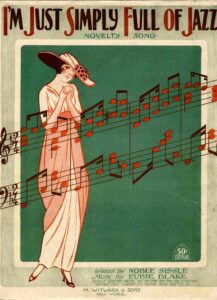YOUR DAILY DOSE OF EUBIE!!!
The terms “jazz” and “blues” came into widespread use in the late teens-early 1920s, but their meaning was not the same as they hold today. There’s been ample discussion of the original of the words themselves, but it’s interesting to note that–just as today when a new style hits the pop charts—suddenly everybody is composing and performing new songs that they style as either “jazz” or “blues.”
Although Sissle often pooh-poohed blues songs as inferior to Broadway show tunes, he and Blake were not above adding songs with “blues” and “jazz” to their repertoire and to Shuffle Along. The production featured two blues—“Gypsy Blues,” “which was influenced by Victor Herbert’s Broadway song, “Gypsy Love Call,” and “Oriental Blues.” Both were dug out of their back catalog of items they’d written and sung on vaudeville before the show opened.
The “vaguely Oriental” costumes that Shuffle Along inherited from a previous production staged by its producer) were used for the song “Oriental Blues” (which Blake quipped was “neither Oriental nor a blues”). The song came from the duo’s trunk. Its origin was especially interesting and illustrated the close relationship of Sissle and Blake. As he recalled: “W.W. Watson’s father bought him a seat on Wall Street, [for] $250,000. And each time we’d go to his home to entertain. Sissle’s over here and you know I don’t write melodies at the piano. And Watson said, ‘Write me an Oriental number.’ I’m writing down the rhythm and I don’t know what Sissle is writing over there. When [Watson] came out and asked us, “You got my song ready?,” Sissle says, “Yes, we do.” Sissle writes under pressure and he’s over there writing the lyric. Sissle don’t hear no melody. And the thing fit together. I don’t know what he’s got over there and he don’t know what I’ve got. We were tuned into each other. I had to change about five notes from the verse and chorus. That actually happened. Twice it happened.”

Another song taken from the Sissle and Blake back catalog was “I’m Just Simply Full of Jazz.” Here “jazz’ means spirit or pep. Soon after Shuffle Along’s success, Blake commented on the need to find the right balance between jazzy rhythms and singable melodies in the show: “The successful song writer of today must be something more than a mere juggler of harmonious sounds. He must be a student of what the public wants—a sort of a psychologist. The mushy, sobby, sentimental love songs of twenty or more years ago would not be at all popular today. Nor would the semi-martial music of songs popular during the United States’ participation in the war make a hit now. What the public wants today are lively, jazzy songs, not too jazzy, with love interest, but without the sickly sentimentality in vogue a generation ago.
Blake made a similar point in another contemporary interview. To be a hit, a song had to combine both a danceable rhythm and a memorable tune: “A modern song, to make any kind of a hit at all, must have ‘pep’ to it, and also must have a ‘catchy’ tune that unconsciously sticks to the mind of the listener.” The balancing of “hot” rhythm with singable melody was one of the great achievements that Blake brought to the Broadway musical. Blake’s analysis of the contemporary song scene reflected America’s fascination with black music and its danceable syncopations, at the same time it revealed the audience’s hesitancy to fully embrace it. A successful song should be “jazzy” but “not too jazzy,” as Blake stated. The trick was to give the audience a taste of the “exotic” new sounds without alienating them.